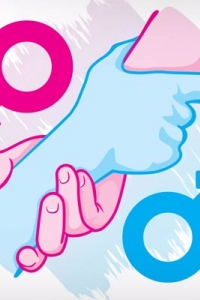
Discussion: Bringing up kids on Gender Equality
Gender equality is a many-layered issue. Writers of school textbooks and teachers are careful to steer clear of bias in gender roles. It’s common to use 'she' rather than 'he' generically in all textbooks. But I remember an editor asking, 'Isn't a blanket use of 'she' also gender bias?' That's food for thought.
TOPIC FOR DISCUSSION
I would like you to study a story titled 'You Have The Power' from a English textbook for 9 year olds which is supposed to promote gender equality.
Is the story offering examples of gender equality? Or is it opening another Pandora's box?
Feel free to critique.
YOU HAVE THE POWER
Rahul and Vaishali were on a sight-seeing tour of Kolkata along with their parents. They had just boarded the Metro train that ran mostly under the city.
‘You better sit down or you will fly away, Miss Matchstick.’ Rahul teased his younger sister, Vaishali, who was tiny and slim.
Their parents frowned and Vashali’s eyes filled with tears, ready to spill. Jerked by the swaying Metro, she fell into an empty seat.
‘Rahul, That's enough. You must encourage your sister,’ said Dad.
Amol and Anu, the children’s parents were always worried about Vaishali. She was shy and spoke little. She was thin, did not eat much and fell ill easily. Both of them often spoke to Vaishali about having a strong mind in a strong body. Amol said, ‘Vaishali, you have to follow a daily routine and be determined to finish any work you start.’
‘You know, that is exactly how I used to be teased.’ Vaishali looked up into a face. A face she had seen before—on the sports page of newspapers.
‘Mary Kom,’ gasped her brother, in wonder. ‘We are on a train with an Olympic boxer!’
Vaishali just stared, hardly able to believe her eyes.
Mary Kom turned towards Vaishali and gently said, ‘When I decided to take up boxing, I was mocked by everyone. They told me I cannot become a boxer because I am a girl. Even the boxing trainers told me to choose a more girlish sport.’ Mary was quiet remembering what she had faced. ‘When I was little and wanted to play with boys, they pushed me off. “Go away! You are a girl,” they said.’
‘Then how did you become a boxer?’ Vaishali asked.
‘I decided to prove to everyone that girls could do everything that boys did. I felt that the boxing ring was the best place to show it to the world. Till then boxing had been a sport for boys and men. I was determined to make it a sport for girls too,’
‘And what did your parents say?’ Rahul asked.
‘My father was not happy. He did not believe I should be a boxer. But he saw I was determined. He saw me practising daily. So he changed his mind. My mother believed me but she worried. You see, we were a poor, tribal family and did not have money for practice shoes or gyms. My parents worked in the fields. I am the eldest. I helped my parents to farm, cut wood and fish. I also took care of the younger brother and sisters. But I was devoted to boxing. I always found time to practise. I would sometimes go for a run before dawn when everyone was sleeping. And I never gave up.’
‘How did you do this?’ whispered Vaishali.
‘I had made up my mind to reach my goal. My mind was strong and I boxed day and night. It was painful, too. My body ached and I would cry at night. But when I won my first medal, I knew that if you work hard, nothing can stop you.’
‘You became the world champ five times and then won the medal at the Olympic Games in 2012,’ recited Rahul.
‘Did you know that I had to put on weight for the Olympics? And 2012 was the first time that Women’s Boxing was part of the Olympic Games at London. I won the bronze medal and was the only Indian woman to enter this event.’
The Metro announcer called out the next station.
‘Oh! That’s my station,’ exclaimed Mary.
‘Just remember, the power of doing what you want to do lies always with you and only you! So go ahead and use that power. All the best! Good bye.’
Mary Kom stepped out of the Metro.
The four of them were silent. Then Vaishali declared, ‘I am going to be a boxer! Dad, will you take me to the gym with you, once we get back? I am going to practise boxing.’
Dad smiled, ‘Of course, Vaishali.’
‘Hey Sis. I will practise too. I am sure, one day, our Vaishali will become a great boxer like Mary,’ Rahul added.
‘I will.’ Vaishali’s eyes were shining.
‘Now my two champs, let me quiz you about Mary Kom. Do you know which Indian state is her home?’
Rahul and Vaishali racked their brains for the answer.
How about you? Do you know?
OPINIONS
Kirthi Jayakumar: This is beautiful, Sutapa di. Thank you for articulating and for making Mary Kom speak out. The context here is beautifully built up to suggest that Vaishali did have low immunity, and her parents talk about a strong body - not a buffed up body - which is GREAT - because thin can be healthy too. Really beautifully done, and removes three HUGE stereotypes - gender, body types and the iciness we shamefully encourage towards the North East.
SB: Thank you Kirthi Jayakumar . I agree that we have killed these stereotypes but have we created one more, such as girls prove that they are equal to boys by adopting those sports traditionally accepted as ‘boys' sports’?
Kirthi Jayakumar: I don't think so, Sutapa di. This story suggests that there is no sport that's exclusively for men or women.
SB: That I agree with. We should refrain from making sports gender-specific
Devika Fernando: Daring and well said
Jean Burke-Spraker: I'm not sure if it does really hit on the issue or not.
The first part reinforces stereotypes. The way Vaishali is portrayed for example.
Yes, Mary comes along and gives a positive example. But ultimately, this is a girl having to act like a boy to get respect. Why can't she just be accepted for what she is? Why must she take on the masculine persona to be considered equal?
Mary is certainly an example of a woman breaking a barrier.
But somehow it doesn't feel like the issue is fully resolved.
SB: Love your views Jean Burke-Spraker Would anybody like to add to her comment?
Suresh Chandresekaran: I'd rather have had Vaishali wanting to do something that traditionally women were not expected to do and Rahul teasing her about being a girl and, thus, unable to do it. That way it is the attitude towards woman that is changing.
Here, firstly the girl is the stereotypical girl. So, for one, it portrays the empowerment as something that women need to acquire which they lack. Second, it seems as though that the 'girlishness' is taken for a weakness that needs eradication. Now, that is another stereotype that needs elimination - there is nothing to look down upon if a woman wants to be a homemaker. If you continue the portrayal of homemaking as something infra dig, then how would any man ever become one - or assist in it?
In short, I'd say that this tale perpetuates a lot of patriarchal sentiments. 1. What keeps a woman down is her own lack of strength 2. The traditional roles of a woman are contemptible and weak.
You need a story that shows that what keeps a woman down is Society and not her own lack of ability. And the jobs that fell to a woman's part in a traditional sense are worthy of respect.
Jean Burke-Spraker: This is an interesting idea. That she must acquire equality.
Suresh Chandresekaran: What I meant was that the story should be about how her brother and, perhaps, her parents change their views about her interests after meeting Mary Kom. That way, it will not be her acquiring equality but getting people around her to ACCEPT her equality.
Jean Burke-Spraker: Ah. Yes. I see that issue. It does not come through. That should be stronger.
SB: Suresh, I am so glad to know your views. Thanks a ton for taking time out to express them. I agree accepting a girl as equal is certainly a much stronger idea of gender equality. That is real equality.
Janaki Hrishikesh: This story not only champions the cause for gender equality openly but also subtly portrays the necessity for north eastern states to be treated on par with and given importance like other states of India. You managed two birds with one stone, Sutapa.
SB: Thanks Janaki. I'm glad you find it a good story but do read it more critically to see if there are instances where the layers of gender equality get blurred.
Ayan Pal: I loved the story! It’s beautiful and carries with it a strong message. Very subtle, yet empowering I must say! Kudos!
Atima Mankotia: This story is too clichéd, too obvious. I would have preferred it to be a little subtle... also why always talk about body image? Thin, fat, fit, unfit ... how about character building , emotional strength... I think our current 9 year olds can handle something less simplistic.
SB: Thanks Ayan. I will keep that in mind Atima, but this one is about gender stereotypes, so...
Atima Mankotia: Yup it's gender bias that girls are made conscious of how they look from the time they are young... too thin, too fat... We need to move away from that. That's the only point I was making here. So that kind of gender bias is still present in this story...
Deepti Menon: When the brother teases his sister, calling her too thin, there is an indication that somewhere later in the story, stress will be laid on a healthy body, which is desirable. The banter makes the story believable, as most siblings tease one another, when they are growing up.
Anita Bahadur: Agree with that. And kids will always be teased - if they are too thin or too fat, have red hair...whatever! So to make this a point about gender equality is silly. The fact that the sister is thin leads to the development that thin or fact, you can resolve to achieve your goal.
Anuradha Gupta: Sutapa why should the boy be teasing Vaishali? Why not the other way around? We have to teach boys at an early age that it is NOT ok to tease girls! Other than that it is a lovely story
SB: Thanks Anuradha, moot point
Deepti Menon: 'The power of doing what you want to do lies always within you and only you.' An inspiring story, Sutapa, which proves that heroes turn so when they decide to use the power within them, regardless of gender. It emphasises on a healthy body in a healthy mind, which is what all parents should inculcate in their children. A perfect story in today's times, when people from the NE face so much of discrimination.
SB: Thanks Deepti.
Sinjini Sengupta: Lovely, of course! Like you, I too am watching out for "audience reaction" Sutapa Basu di, but this is a very harmless way of putting it. I guess the real challenge will come when Vaishali will have to choose between an ailing child and her match like Mary Kom supposedly had to. Or, do you become a "Goenda Ginni" as shown in Zee Bangla where you lay out the alu chochchori for your brother-in-law and then go to save the world.
SB: Sinjini, choices are always difficult for either gender but more so when you are a mother. And what's the harm in balancing both worlds as a woman. If you can, then kudos to you.
Sinjini Sengupta: Yes totally! But then to begin with why the brother-in-law can’t cook his own alu posto is also a question that needs to be raised at a social level. Personally, we all have to find our own balances (or, escape routes).
SB: That's a point to consider too, Sinjini.
Sinjini Sengupta: If as a gender, our time, energy, priority is so pre-committed it becomes a challenge to live our lives. While I applaud multitaskers and super women, I think we should also allowed to be selfish at times.
Joyita Shaw: Story is good but somehow lacks the real purpose. We women sometimes imitate men so to find a place within the patriarchy, as if they are the perfect model to follow. However we must try to hone the skill we have within without setting Man as our model. Every human being is unique and a woman must stand on her own, she doesn't need any man to define her or to acknowledge her. A woman must define herself without being ashamed of what she is.
SB: I fully endorse your views, Joyita.
Amartya Bagalrana: Wonderful
SB: Thanks Amartya Bagalrana.
Radhika Tabrez: This needs an applause, Sutapa Ma'am. It is balanced and well put.
Manna Bahadur: You have shown the right trend, Sutapa. Hope there are more such stories teaching right values to both the genders, not just in sports but in other areas too. Really appreciate this.
Harshali Singh: It’s a story based on fact , the hero of the story is someone whom we all admire and hence the story, for me, is a go ahead.
Furthermore the discussion goals on this story are more pertinent. Where will it lead, what will be articulated and what learning milestones and touch points are to be achieved.
SB: Thanks everyone for this animated discussion.
About the Author







Comments